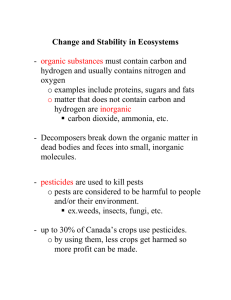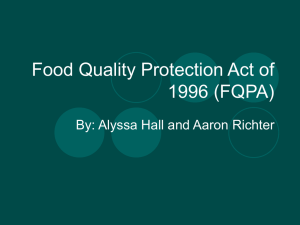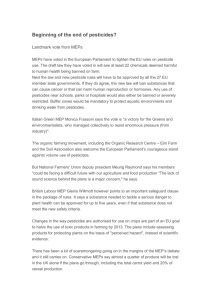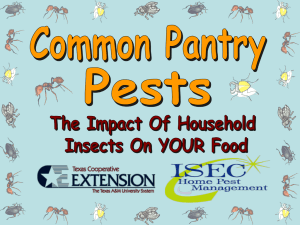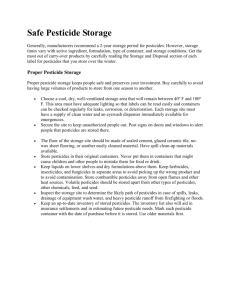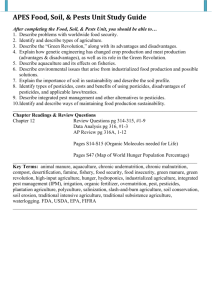killers
advertisement
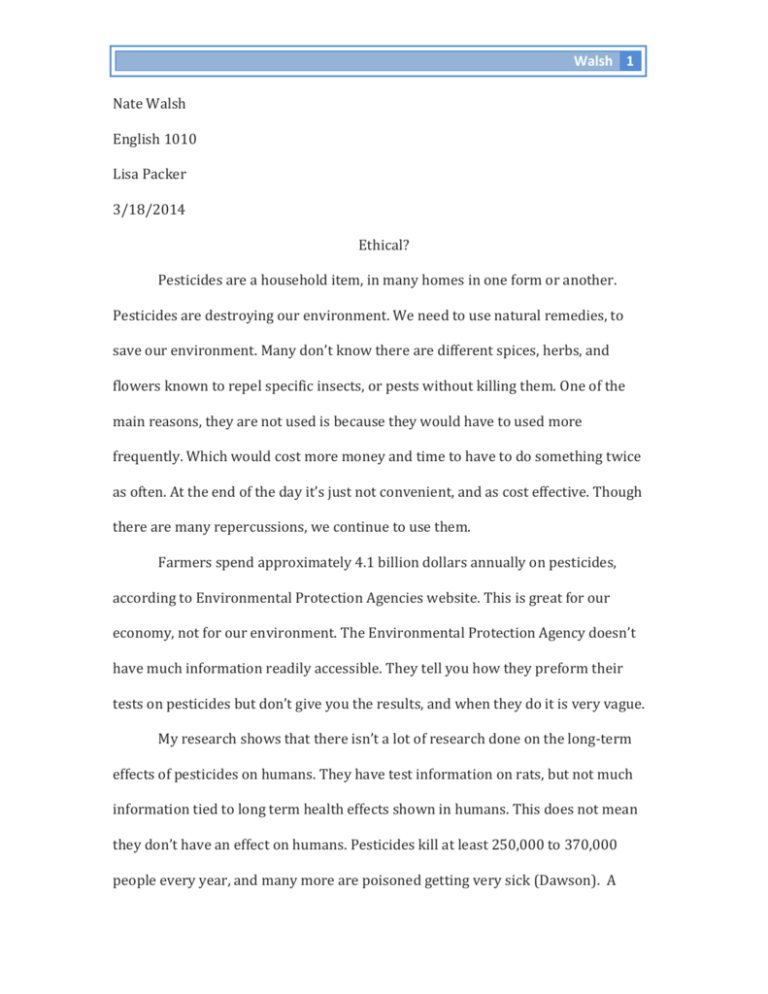
Walsh 1 Nate Walsh English 1010 Lisa Packer 3/18/2014 Ethical? Pesticides are a household item, in many homes in one form or another. Pesticides are destroying our environment. We need to use natural remedies, to save our environment. Many don’t know there are different spices, herbs, and flowers known to repel specific insects, or pests without killing them. One of the main reasons, they are not used is because they would have to used more frequently. Which would cost more money and time to have to do something twice as often. At the end of the day it’s just not convenient, and as cost effective. Though there are many repercussions, we continue to use them. Farmers spend approximately 4.1 billion dollars annually on pesticides, according to Environmental Protection Agencies website. This is great for our economy, not for our environment. The Environmental Protection Agency doesn’t have much information readily accessible. They tell you how they preform their tests on pesticides but don’t give you the results, and when they do it is very vague. My research shows that there isn’t a lot of research done on the long-term effects of pesticides on humans. They have test information on rats, but not much information tied to long term health effects shown in humans. This does not mean they don’t have an effect on humans. Pesticides kill at least 250,000 to 370,000 people every year, and many more are poisoned getting very sick (Dawson). A couple years ago pesticides were responsible for the death of two children in Layton, Utah. Pesticides have been shown to have effects on the communities in close proximity with the spray site. Pesticides get into the near by water and underground aquifers and have had a great impact on nearby communities and animals relying on these rivers and streams. Pesticides have had a major impact on our environment, I have learned from watching many different documentaries. They have been linked as one of the main causes leading to the vanishing of the bee's, amongst other things such as us taking their honey and giving them corn syrup water to replace it. Which is basically like taking their fresh produce and giving them junk food to survive on. It is common knowledge that without the bee's, no pollination, leading to many plants dying off. This is a problem that if we don't fix could have insurmountable repercussions. Some may argue pesticides are a necessity; though there are many natural remedies that can be just as effective that wont destroy our environment in the process. Most big corporations don’t use natural remedies; it would obviously be more work having to do it more often, which would more time and money. Permaculture has created a system where life feeds its self. Many insects eat particular plants; with biodiversity you can attract insects that eat the other insects that eat your plants. Also, by combining certain plants that take nutrients particular other plants don’t need, that give off the nutrients the other plants need. Biodiversity you can take care of pesticides, and fertilizer. It is very specific to what has to be planted with each other to get the right results. Walsh 3 Commercial farming usually specializes in a particular plant. It is easier to provide the needs of one species. It will usually have a specific pest that likes it, so they know what to protect against. When you only have one species of plant, all the particular nutrients for that species get taken out and never replaced. Lack of crop rotation was a contributor to the 1930’s Dust Bowl. Permaculture is a more recent development, but has shown to be a much more sustainable alternative, to our created alternative. When permaculture is not practiced there are many natural remedies for insects a few include garlic water, soapy water, or water with hot sauce sprayed on plants with a spray bottle. Marigolds, and many other flowers will deter pests and will attract bugs such as Ladybugs and Praying Mantises, which eat the pests. The natural remedies are usually not as potent and the residue left behind wears off much faster than the chemical pesticides. It still can be very effective, and doesn’t destroy the environment. Is more money really worth destroying the environment? There's an ancient proverb saying, "Only when the last tree has died and the last river been poisoned and the last fish been caught will we realize we cannot eat money." I don’t foresee this changing anytime soon, at least not until there is a more cost effective way or until the negative effects start to become detrimental. I hope we figure something out before it’s too late. I think it is crazy that they are more concerned with money than the environment. There is an Indian saying “This world is not inherited to us from our parents, it is borrowed from our children”. Personally, I find the direction we are heading very scary. They don’t take into account the future repercussions, and when they do they find the immediate income as more valuable. Walsh 5 Work Cited Dawson, Andrew H., et al. "Acute Human Lethal Toxicity Of Agricultural Pesticides: A Prospective Cohort Study." Plos Medicine 7.10 (2010): 1-10. Academic Search Premier. Web. 18 Mar. 2014. EPA, Web. 18 Mar. 2014. Much of what I already knew came from watching different documentaries in the past or things I already knew. I did not do the best job of tracing where I got my other information. When I was on the EPA website I found an article stating the amount of money spent on pesticides, but wasn’t able to find it again later when trying to cite it. Their website was very hard to get any useful information and to find anything relevant you had to dig through a lot of information. I think it would be hard to argue with all the negative effects created by pesticides. I was able to use all the rhetorical appeals with facts, effects, and it is very relevant to our world today. I made a lot of revisions, many to help tie in certain aspects better. Yes they helped me make more sense of what I was trying to say, and gave me better ways to communicate more effectively. I learned to plan ahead better, and it taught me to organize better. It also taught me a lot of my bad habits, and helped me improve my communication. My biggest was trouble was that I already knew a lot of the information I used, from things I’ve retained over the years. So I wasn’t sure how to cite them.
